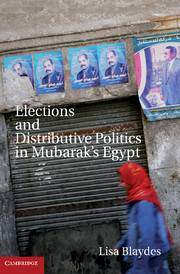Book contents
- Frontmatter
- Contents
- List of Figures
- List of Tables
- Acknowledgments
- 1 Introduction
- 2 Political and Economic Change since 1952
- 3 Elections and Elite Management
- 4 The Politics of Infrastructure Provision
- 5 Electoral Budget Cycles and Economic Opportunism
- 6 Vote Buying, Turnout, and Spoiled Ballots
- 7 Elections and Elite Corruption
- 8 Elections and the Muslim Brotherhood
- 9 Liberal Intellectuals and the Demand for Democratic Change
- 10 Foreign Pressure and Institutional Change
- 11 Egypt in Comparative Perspective
- 12 Conclusion
- Bibliography
- Index
10 - Foreign Pressure and Institutional Change
Published online by Cambridge University Press: 04 February 2011
- Frontmatter
- Contents
- List of Figures
- List of Tables
- Acknowledgments
- 1 Introduction
- 2 Political and Economic Change since 1952
- 3 Elections and Elite Management
- 4 The Politics of Infrastructure Provision
- 5 Electoral Budget Cycles and Economic Opportunism
- 6 Vote Buying, Turnout, and Spoiled Ballots
- 7 Elections and Elite Corruption
- 8 Elections and the Muslim Brotherhood
- 9 Liberal Intellectuals and the Demand for Democratic Change
- 10 Foreign Pressure and Institutional Change
- 11 Egypt in Comparative Perspective
- 12 Conclusion
- Bibliography
- Index
Summary
The distributive implications of authoritarian elections in Egypt extend beyond the internal political dynamics that have thus far been the focus of this book to include Egypt's relationship with external actors, such as the United States. External actors play a critical role in providing financial assistance for the regime. This chapter investigates how elections affect Egypt's relationship with external actors, such as the United States, and why foreign efforts to promote democratization in Egypt have been so unsuccessful. To answer these questions, I develop an agenda-setting model of policy change in authoritarian regimes where foreign actors, such as the United States or international financial institutions (IFIs), serve as veto players along with the ruling elite. I argue that the actions of foreign actors tend to promote the electoralization of authoritarian regimes rather than democratization because democratization could end regime dominance. This is because authoritarians are agenda setters and they have the ability to select their preferred point (i.e., the set of institutions) after considering the winset of the foreign actor as a constraint. I discuss this model in the context of electoralization in Egypt with a focus on the amendment to Article 76 of the Egyptian constitution, which created the country's first multicandidate presidential elections in 2005.
PREVIOUS LITERATURE
This chapter explores the extent to which foreign actors, such as the United States and IFIs, can serve as veto players in a country's domestic policy environment.
- Type
- Chapter
- Information
- Elections and Distributive Politics in Mubarak’s Egypt , pp. 192 - 209Publisher: Cambridge University PressPrint publication year: 2010



